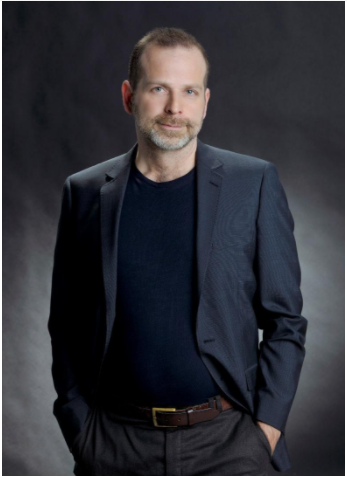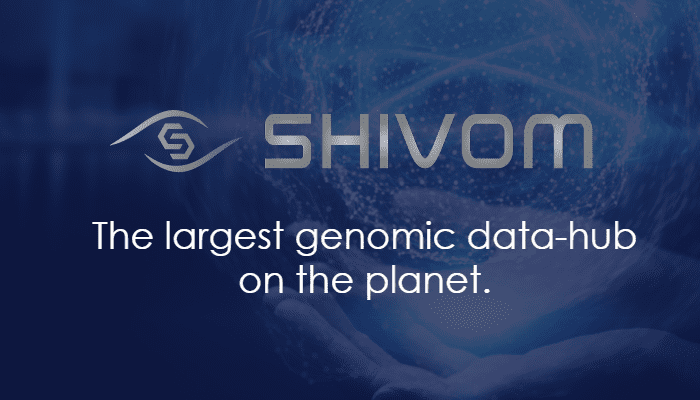 Axel Schumacher is the Co-Founder of Shivom, a blockchain project which will enable DNA data donors to collaborate with revolutionary changemakers in biotechnology, healthcare industry, and government-ordained research institutes. Axel with be sharing with us the details of this project in this interview:
Axel Schumacher is the Co-Founder of Shivom, a blockchain project which will enable DNA data donors to collaborate with revolutionary changemakers in biotechnology, healthcare industry, and government-ordained research institutes. Axel with be sharing with us the details of this project in this interview:
1) Could you please tell us about yourself?
Axel: I am a trained researcher and got my Ph.D. in Genetics from the University of Cologne, Germany. I guess I had a rather unusual career, working in different countries (Germany, Canada, Switzerland, UK, Sweden) with changing directions several times. There were too many things that I was interested in and that are worth pursuing, from working on complex diseases, neuroscience, aging & longevity, tech innovation, molecular science, biochemistry, bioinformatics, politics, business strategy, game theory, and finally digital health and blockchain. For a long time, I had my own research group working on the genetics of complex disorders such as Alzheimer’s, Bipolar disorder, Schizophrenia, and cancer. My work was focused mainly on a field called epigenetics. Epigenetics, to put it simply, is the study of biological mechanisms that will switch genes on and off. Epigenetic modifications (e.g., DNA methylation) can determine which cells terminally differentiate to end up as skin cells, pancreatic cells, brain cells, etc. If such processes do not work properly, epigenetic change can result in many complex diseases like cancer. In recent years I gained more experience in data-driven decision making in pharmaceutical R&D and helping clients building their precision medicine and genomics infrastructure. I also joined the Blockchain Research Institute in Toronto as a faculty member, advising companies and governments how to revolutionize healthcare systems with blockchain technology.
2) What is Shivom?
Axel: Shivom is a precision medicine and global healthcare startup, focused on revolutionizing healthcare by leveraging new technologies, for example, genomics, artificial intelligence and blockchain, all technologies which have reached the potential to significantly improve global healthcare. The current healthcare space is fraught with major problems such as data siloes, lack of diversity, lack of interoperability, little privacy and widespread data breaches, which makes effective healthcare and precision medicine challenging. Precision medicine is an emerging approach for disease treatment and prevention that takes into account individual variability in genes, environment, and lifestyle for each individual. It is in contrast to a one-size-fits-all approach, in which disease treatment and prevention strategies are developed for the average person, precision medicine will allow doctors and researchers to predict more accurately which treatment strategies for a particular disease will work in which groups of people. Genomics can make this possible, with considerable implications for understanding and treatment of many rare diseases, and is perfectly suited for utilizing newly developed blockchain technology particularly for the secure and private storage of healthcare information. The Shivom ecosystem plans to solve the healthcare challenges by offering an open a blockchain-based genomics database alongside a web-marketplace and innovation hub, which will allow providers and third-party vendors to add and market customized apps and precision medicine services. Upon establishing a highly scalable healthcare vertical, Shivom will extend its services to form a global network of genomic counselors and associated laboratories as well as forming a non-profit research and development (R&D) organization for a fully integrated healthcare service system. The research institute will be based on open-innovation that optimally connects patients, clinicians, researchers, insurers, clinical laboratories and other stakeholders. The Shivom platform works on the principles of open collaboration, transparency, and integrity and provides patients with complete control over their own genomic data. Patients/donors via crypto keys will have full control over their sensitive personal health data and be able to donate or monetize on their genomes via Shivom’s blockchain platform. By developing the world’s largest genomic data-hub and healthcare services platform, Shivom plans to usher in a new era of healthcare and precision medicine. Shivom anticipates our massive genomics datahub and healthcare ecosystem will create value for all individuals, not-for-profit organizations, governments and for-profit entities worldwide.
3) What inspired you to launch a Blockchain and Cryptocurrency venture with Shivom?
Axel: A few years ago I noticed that the healthcare sector and pharmaceutical companies, in particular, had the problem of getting access to and sharing private healthcare and genomic data. However, sharing of human genomic data collected by big pharma is essential for science and society. Having access to good quality data and having an open data policy may be one way for companies to reduce their R&D spend, for some companies it may even be needed to simply survive in an increasingly competitive market. To solve some of the problems, I got interested in blockchain technology and its application in the healthcare field. I wrote a book on the topic (The blockchain and healthcare Strategy Guide), and to my surprise, it was a huge success. Companies, scientists, think tanks, consulting firms, patients and even governments approached me to help them get up to date with blockchain technology. Building on my experience with another precision medicine company I co-founded, I realized that it would make sense to build a large enterprise that focuses on revolutionizing the global healthcare ecosystem by applying modern technologies, including genetics and blockchain. So together with my co-founders I started to develop a sophisticated business model and making the idea a reality.
4) What are some of the problems you see with genomics research and the availability of genomics data right now?
Axel: The biggest challenges in genomics research are access to populations, aggregating large data sets, and proper analysis of that data. Breaking up genomics data silos is of utmost importance because the value of genomics data silos is very limited in their current state, but when deployed in a way to aggregate genomes globally, a gain of value will be observed according to the law of accelerating returns rather than a law of diminishing returns. The opportunities to find patients somewhere in the world with unusual mutations and phenotypes, or individuals with disease-resistant mutations, would increase significantly, shifting precision medicine into the next gear. By combining genomic sequencing data with health records, researchers and clinicians will have a vast resource that can be interpreted to improve patient outcomes and also be used to investigate the causes and treatments of disease. For big data approaches to thrive, however, historical barriers dividing research groups and institutions need to be broken down and a new era of open, collaborative and data-driven science ushered in. Probably the biggest obstacle to using advanced data analysis on genomics data is data access. A lot depends on new regulations in that space. Developments in artificial intelligence and sophisticated re-identification algorithms have led to an increasing concern about the effectiveness of existing data protection laws. To address those issues, the European Union as a global forerunner in personal data protection worked out the General Data Protection Regulation (GDPR), intended to strengthen and unify data protection for all individuals within the European Union (EU). It also addresses the export of personal data outside the EU, so almost all large corporations worldwide will be affected. Another obstacle is the data generation itself as people are often skeptical about DNA sequencing, but the genomes have to come from somewhere. When they do get sequenced, people often have limited access to their own data, and even when they do, they have only limited ways to use this data for improving their health or for sharing with third parties, e.g., for scientific studies. So, what is needed is a platform to store data securely, anonymized, impenetrable to malicious attacks or unauthorized access, but at the same time publicly accessible and searchable.
5) How will Shivom help improve help benefit the genomics industry as well as donors who choose to donate their DNA for genomics research?
Axel: The pharmaceutical industry, as well as global healthcare systems, are under intense pressure due to changing and partly fading business models. Almost all drug manufacturers need to increase the efficiency of drug development because of the current model of operating addresses neither the growing demands for innovative drugs nor the increasing cost. Spending is expected to be driven by aging & growing populations, developing market expansion, and by clinical and technology advances, among others. Shivom is the ecosystem that can solve many of those issues, e.g., by boosting clinical trials, supporting patient stratifications, or in the development of genome diagnostics.
Genomic data are essential for nowadays drug development and regulatory landscape. Of the 41 novel new drugs approved by the FDA in 2014, 9 (22%) are classified as a personalized medicine treatment that uses biological (genomic) markers to guide prescribing practices, and we expect this number to keep increasing. A platform that provides the necessary data & privacy plays a pivotal role in staying competitive. By making data accessible on a global level, including ethnicities with unusual mutations and phenotypes, would significantly improve clinical trial outcomes and further advance development and adoption of precision medicines.
For the patient, understanding their genome has fundamental consequences. Once people have uploaded their genome sequence or after they got their DNA sequenced with one of our kits, they get access to various health-related apps to manage their health. Each individual can learn only what they want to learn about themselves. Sometimes, people want to know just parts of their potential future, in particular, that information that has actionable consequences. Using smart contracts on the Shivom platform, people can be guided in their learning process, and they can easily decide if they want to learn about their risk of developing certain diseases or not. Patients can also share their data to help their healthcare providers develop improved treatment strategies to manage their health outcomes, and to participate in clinical trials that may ultimately develop a treatment for a disease they are at risk for developing. Thus both the consumers and the industry as a whole benefits.
6) How does blockchain technology help Shivom accomplish this?
Axel: Blockchain is essential for the Shivom platform as it offers superior security and privacy when compared to today’s prevailing centralized solutions. When storing healthcare data in a blockchain, cryptography is used for encrypting the contents of a message or transaction, so that only intended users can open and read its contents. Overall, the blockchain solution provides significant improvement and value over standard centralized databases in multiple areas relevant to Shivom: A) Security – Healthcare data cannot be revised or tampered with, B) Getting rid of unnecessary middlemen that increase costs in healthcare systems, C) Help keep identities private which makes people more eager to share their valuable data, D) Help with interoperability across borders, opening up a huge worldwide community for Shivom, E) The permanent ledger provides structured, time-stamped data for everybody, which is especially important in highly regulated environments such as the medical sector, F) Users can access it from everywhere, allowing Shivom to serve under-represented markets and transitional countries such as India, Brazil, Turkey, or the Middle East, G) Real-time transactions occur automatically via pre-defined smart contracts which makes transaction in the Shivom ecosystem fast and cheap, H) Consensus mechanisms allow transactions on the Shivom platform to occur error-free, and I) blockchain makes assets securely available globally.
7) Can you tell us more about the technology and components of your Shivom ecosystem that make it function?
Axel: The Shivom platform is designed to be blockchain agnostic and will utilize best-of-breed technologies depending on network requirements. On top of the blockchain layer, Shivom plans to deploy a sophisticated cryptographic identity layer. In the beginning, the main components of the platform will be based on distributed ledger technology derived from the Hyperledger Fabric, and the BigchainDB framework (Decentralized Data Exchange; Ocean protocol). We are also evaluating the use of modern cryptography – such as zero-knowledge proof systems or secure Multi-Party computing – that enable an individual to provide proof to a third party without sharing personal data, to establish secure decentral key management or analyze data with a 3rd party service without sharing unencrypted data with the service. This type of modern cryptography is entirely novel and constantly improving. The Shivom roadmap is built upon a phased approach to adopt current cryptography solutions for data sharing, proofs, and DNA data processing. We are also working with our partners to add artificial intelligence to the platform, so that the massive datasets can be analyzed by sophisticated approaches, for example, novel deep learning algorithms.
8) How much do you intend to raise in the OMX Token Sale and what are the steps for contributing?
Axel: We are aiming at raising 75k ETH. People who are interested in participating in our Shivom project can find more information on our webpage Shivom.io, sign up for the newsletter to get all the recent updates, and follow us on our social media channels. A detailed description of the project can also be found in whitepaper, and registration for the crowd presale has begun on https://shivom.io/public-sale.html.
9) What were some of the biggest challenges you encountered while working to launch your ICO?
Axel: There are so many ICOs out there right now that it makes it difficult for people to differentiate good and solid projects. As such it needs a lot of education and time commitment to show that we are an excellent team with an outstanding business plan. Fortunately, most people quickly realize that healthcare and data privacy matters, mainly because almost everyone has some family history of complex disease. On the side of building the right healthcare environment, many organizations are not yet prepared for sudden paradigm shifts and are more familiar with incremental or evolutionary change, which is slow and proceeds only in small steps. Fortunately, there are ways to tackle these problems. One way is to work with regulators and governments to support all stakeholders in the precision medicine sector to truly leverage the potential of technologies for healthcare. That’s why we are also working directly with governments that realize that they should promote the safe use of digital health technologies. As an example, we partnered with the government of Andhra Pradesh, India’s eighth-largest state, starting a pilot to build a blockchain-based DNA database of its 50+ million citizens. As part of its project, Shivom will sequence people with specific diseases, establish a development center in Fintech Valley, Visakhapatnam, and work closely with the government’s International Institute of Digital Technologies at Tirupati on cybersecurity and analytics.
10) What’s going to happen to Shivom after the token sale concludes and what where do you see things in 5 years?
Axel: Thinking about the near-term future, we will heavily invest in getting our platform and service offering to the point of public release. We have many potential partners that are eager to partner with us to build a robust global healthcare ecosystem. We will be releasing a proof of concept early product in the next several weeks, and expect a full useable platform to become available towards the end of the year. Additionally, we will begin developing our sequencing kits for shipment to our customers who want to get their DNA sequenced and uploaded to the platform. Directly after the token sale, we will also start working on our pilot project in India where we will focus on getting some disease-specific cohorts sequenced. This is important because certain ethnic groups are still underrepresented in global databases. This results in exclusion, as minority and under-represented groups miss out on the benefits from advances in predictive and personalized medicine because abnormal genomic variations that exist in their ethnic or geographical location will not be present in the data that researchers are working with. This pilot project will be the start of a monumental shift in precision medicine, using the predictive power of genetic data to empower the Andhra Pradesh healthcare system to move from reactive to more preventative care. We are also currently in discussions with other governments and institutions to implement pilot projects around the globe. Our long-term vision is to help all healthcare-systems around the globe to revolutionize their healthcare ecosystems as we are passionate about changing the healthcare status quo, and driving a fundamental evolution that results in a system of universal access to the best and most effective predictive medicine.
11) What are your marketing and sales strategies to achieve that?
Axel: A significant chunk of our resources is reserved for marketing and community building. We will particularly use high-quality marketing teams and our partners to make Shivom a large healthcare player around the planet. This will cover advertising via traditional marketing channels and personal-based approaches as well as produce educational materials, roadshows, cooperating with other genomics initiatives, organizing events and conferences, and key opinion leader (KOL) management. A central part of growing the Shivom community will be with engaging in partnerships, e.g., with patient support groups, governments, pharma companies, the research community, other wellness and fitness service providers, influencers from the quantify-self movement, among many other partners. Our business will benefit from this kind of interactions with existing market-participators where we will leverage their expertise in adopting to local customs and regulatory environment quickly. We are working globally, meaning we target almost all areas in the world, especially the transitional economies in Asia and South-America, and emerging healthcare ecosystems where we expect a significant expansion of healthcare services in coming years and where we are already building community partnerships (e.g., in countries such as India, Nigeria, Brazil, Turkey, or Egypt).
12) Could you tell us a little about your team and customer support?
Axel: We definitely have a world-class team as our international team harnesses a wealth of cross-sector experience, skills, and perspectives that come together around a common vision for Shivom and the democratization of the healthcare industry. The team shares a genuine optimism for the future, entrepreneurial drive and the passionate belief that Shivom will herald the next era of genomics and precision medicine and be a powerful force for positive social impact and good globally. The Shivom team is composed of entrepreneurs who can make things happen much quicker than large companies and academic groups. We are go-getters and know that if anything is to be, it’s really up to us. We set bold but realistic goals, and in case we can’t solve a problem ourselves, we seek out those who can. As an example, next to our advisors and partners, we assembled a unique set of people, the Shivom Innovation Council, which will function as an internal think tank to support and inform Shivom’s senior management team about future technology and industry trends and other strategic considerations. The Council is comprised of world-class experts and thought leaders in a variety of key areas and domains ranging from AI, Genomics, Business Strategy, Politics, Cryptography, Computer Science, Cyber Security, Telemedicine, IoT, Futurology, to Precision Medicine. In the end, we want to put our users in the center of our attention, and we do whatever it takes to accomplish the dreams of our worldwide community.
13) Would you like to talk about your legal and security measures?
Axel: Regulatory compliance and transparency are key to the long-term success of the Shivom ecosystem, and our budget allocated to legal costs ensures that we continue to fit within regulatory parameters in any market we operate. For example, we want to make sure that we fully comply with GDPR rules, a European Union regulation that established a new framework for handling and protecting personal data. These strict regulations should and will be applied to users in all other areas of the world, and will provide competitive advantage to us as being a fully compliant company. For Shivom, it is essential that people have—and know they have—control and clarity over how their data is used by any organization they interact with. We will establish procedures to respond to requests for data access, rectification, objection, restriction, portability, and deletion (right to be forgotten). As such, we are, and will continue to be in direct contact with regulators and will employ a dedicated data protection officer.
But this is not yet enough for us. In addition, we will form a not-for-profit, global foundation that will ensure security, sustainability and proper ethical conduct of the Shivom ecosystem. The Foundation will strive to establish ethical and efficient stewardship, which involves collaborating, identifying common interests and creating incentives for all stakeholders to act on them. The Foundation will provide for a technical steering committee and will also establish an advocacy & marketing committee and a knowledge network for industry outreach and education. Finally, it sets forth codes of conduct, including transparency to ensure the formation of trusts. Building this foundation will mitigate some of the strong legal uncertainty surrounding emergent technologies such as genomics and blockchain, thereby helping the genomics ecosystem and partners alike to move beyond the proof-of-concept stage. The foundation will work on legal and regulatory frameworks to ensure a long-term, sustainable and technically sound healthcare service.
14) Do you have more information for our readers?
Axel: I would like to reach out to all out there that are interested in making a positive impact on our planet. We strive to build a global community of people who also would like to revolutionize healthcare and advance the greater good. We need your input, active participation and ideas to make this vision a reality, a movement that is less about helping one person at a time and more about changing systems to help all of us. We are all connected and interdependent. So, please join our efforts, subscribe to our newsletters, read our blogs, or join us on Twitter, Telegram, or Facebook to learn even more about how your actions continue to make a difference daily.
Website: https://shivom.io/



































